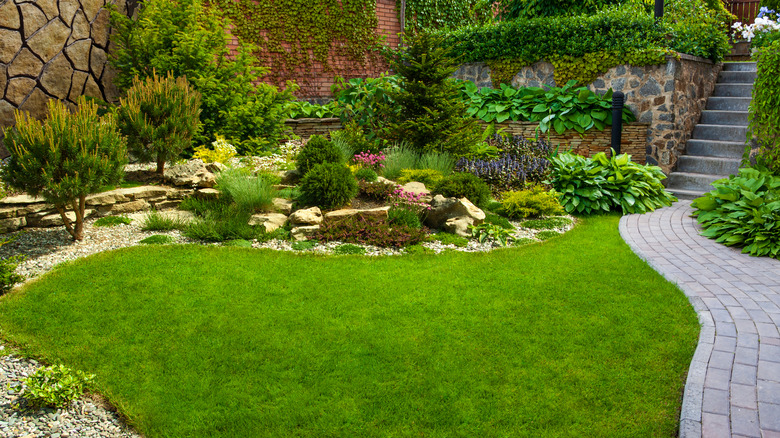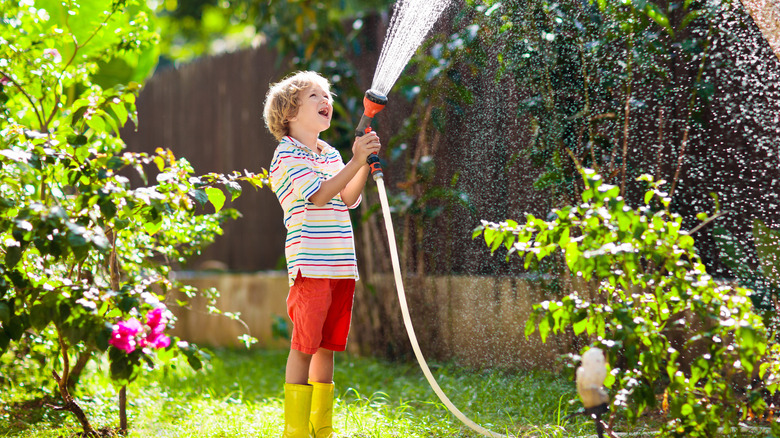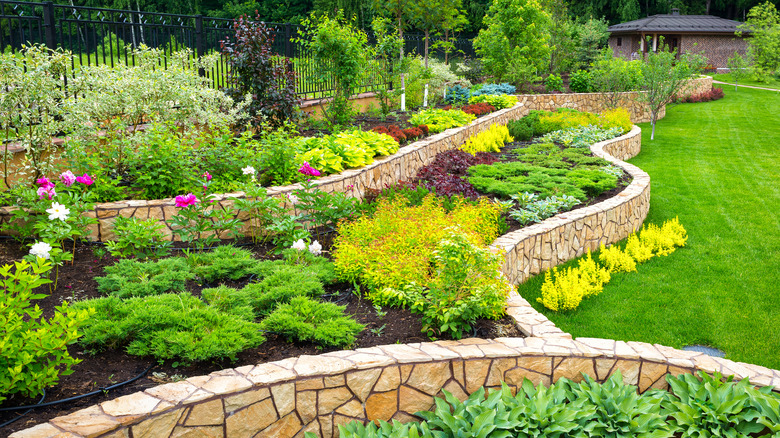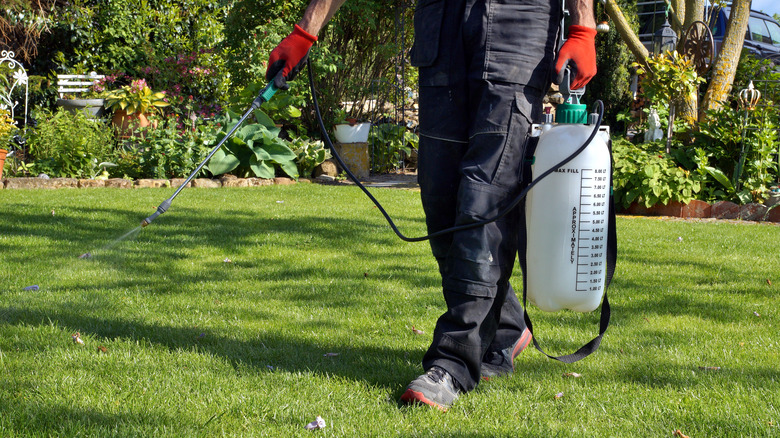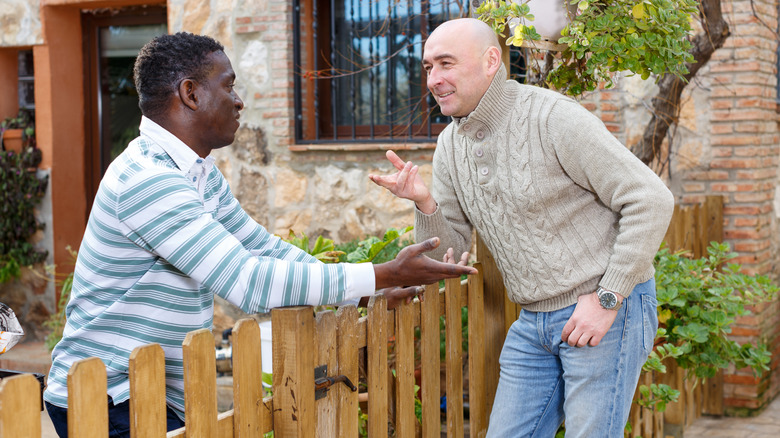The Biggest Gardening Mistakes You're Making, According To An Expert - Exclusive
Maintaining an extraordinary garden is hard enough when one has to contend with seasonal droughts, hungry critters, and rising prices for seeds and equipment. However, even experienced gardeners might be surprised to learn that some of the habits they've picked up over the years are doing more harm than good to their plant life.
According to Karen Musgrave of Hicks Nurseries – a New York State Certified Nursery & Landscape Professional with 30 years of gardening experience, who spoke exclusively to House Digest — there are quite a few basic mistakes that are made in our green spaces every day. From overwatering and overfertilizing soil to planting crowded garden beds, most routine mistakes can be easily fixed to fantastic effect. However, in order to take your home's garden to the next level, it's always necessary to maintain a positive attitude and accept sage wisdom whenever you receive it. "Even the best gardeners have killed a plant or two," Musgrave shares. "Be patient with yourself, be open to advice from seasoned gardeners and keep learning."
Overwatering your plants
Plants die without water, so watering your plants on a daily basis is a no-brainer, right? Well, according to Musgraves, this common attitude may be destroying your garden without you knowing it. "Overwatering is the number one mistake people make in their garden," Musgrave reveals. "Plants and lawns should be watered deeply and infrequently, not daily. This encourages a deeper root system, which is healthier for plants; frequent waterings encourage shallow roots that struggle during stressful periods of drought or harsh winters."
Of course, overwatering your garden is easy to do if you're unsure how much water the various plants in it should receive. Per Musgraves, your lawn, as well as most of your flowers and vegetables, will be healthiest if they receive around 1-1½ inches of water per week. On the other hand, established trees and shrubs only require 1-1½ inches of water every seven to 14 days.
If you're unsure how much water your garden needs, Musgrave has you covered. "Set out a few shallow containers on the lawn," she continues. "Run the sprinkler or sprinkler system for one hour; measure the amount of water in the can. If you collected 1/2 inch of water, it would take two to three hours to apply the needed amount."
Crowding your plants
Overcrowding your favorite plants is another surefire way to limit their growth potential, as noted by Musgrave. "New gardeners often seem to overcrowd their plants," she explains. "We all want our garden beds to look full and beautiful instantly, but it is important to remember that plants need room to grow."
So, how does one figure out how much space a plant will need? By planning ahead, of course. "Before purchasing and planting, measure the length and width of your garden beds and bring those measurements with you when you shop," Musgrave advises. "Follow the spacing instructions on each plant's tag. This encourages proper air circulation and allows water to easily reach the plant's roots."
If the result of your carefully-spaced garden beds seems underwhelming at first, don't worry: Not only will your plants grow to look amazing over time, but your flora will be less susceptible to problems. "Be patient. They will grow and fill in quickly," Musgrave continued. "Additionally, plants that are planted too close together and are touching such as roses, tomatoes, and arborvitae are more susceptible to fungus and disease issues."
Misusing fertilizer
Any experienced gardener will tell you that too much of a good thing can often signal the death of your favorite flora. As such, water isn't the only thing you'll want to limit in order to maintain a healthy garden. "More is not always better," Musgravs notes. "Read and follow the instructions on fertilizer bags and bottles. Too much fertilizer can actually harm or kill a plant, even if it is organic."
It's also worthwhile to keep in mind that not all fertilizers are appropriate for your specific application. As such, you may be required to invest in separate fertilizers for your flowers, lawn, and vegetables. "Consider why you want to fertilize and choose the best option for your specific plant," Musgrave continues. "Flowers prefer a fertilizer that promotes blossoming, while lawns may need root development and greening."
Of course, finding the best fertilizer for your unique needs will not always be easy. Luckily for homeowners who love to garden, help is never too far away. "Speak with an expert at an independent garden center for help choosing the best formula to fulfill your needs," Musgrave adds.
Not asking for help
Starting a garden can be quite daunting for some people. Not only is there a ton of information to learn about caring for plants, vegetables, and a healthy lawn, but you may feel intimidated by what you see around you in your neighborhood. For this reason, it's important to ask for help when you need it and gracefully accept beneficial wisdom. "Gardening is not a competition — it's a community and we love to help others be successful," Musgrave proclaims. "Use the resources around you, such as neighbors, friends, family, garden clubs, and the experts at your local garden center for help."
Although sharing tips and knowledge is a great way to befriend your neighbors, some homeowners might not feel comfortable going to members of their community for gardening advice. Luckily, you can still benefit from having an amazing gardener next door even, if you're the shy type. "Simply paying attention to what others are doing in their gardens, when they prune, harvest, plant, etc., will start to educate you on what to do," Musgrave concluded. "There is a lot of trial and error in gardening."
